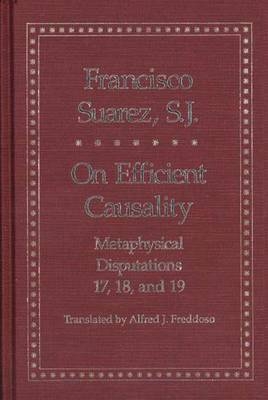
On Efficient Causality
Yale University Press (Verlag)
978-0-300-06007-2 (ISBN)
- Titel z.Zt. nicht lieferbar
- Versandkostenfrei
- Auch auf Rechnung
- Artikel merken
The Spanish Jesuit Francisco Suarez (1548-1617) was an eminent philosopher and theologian whose Disputationes Metaphysicae was first published in Spain in 1597 and was widely studied throughout Europe during the seventeenth century. The Disputationes Metaphysicae had a great influence on the development of early modern philosophy and on such well-known figures as Descartes and Leibniz. This is the first time that Disputations 17, 18, and 19 have been translated into English.
The Metaphysical Disputations provide an excellent philosophical introduction to the medieval Aristotelian discussion of efficient causality. The work constitutes a synthesis of monumental proportions: problematic issues are lucidly delineated and the various arguments are laid out in depth. Disputations 17, 18, and 19 deal explicitly with such issues as the nature of causality, the types of efficient causes, the prerequisites for causal action, causal contingency, human free choice, and chance.
Part 1 Disputation 17 - on the efficient cause in general: what an efficient cause is; the types of efficient causes. Part 2 Disputation 18 - on the proximate efficient cause and on its causality and on all the things that it requires in order to cause: whether created things really effect anything; the principle by which one created substance produces another; the principle by which created substances provide accidents; which accidents are capable of being principles of acting; whether accidents effect other accidents by themselves without the concurrence of substantial forms; whether an accident is merely an instrument in the production of another accident; whether, in order to act, an efficient cause must be distinct in reality from the recipient of the action; whether, in order to act, an efficient cause must be conjoined with or close to the thing acted upon; whether, in order to act, an efficient cause requires a patient that is dissimilar to it and in what proportion; whether action is the proper notion of causing for an efficient cause, that is, its causality; whether an efficient cause corrupts or destroys a thing by effecting something and how. Part 3 Disputation 19 - on causes that act necessarily and causes that act freely or contingently - also, on fate, fortune, and chance: whether among created efficient causes there are any that act necessarily, or what sort of necessity that is; whether among efficient causes there are some that operate without necessity and with freedom; whether there could be any freely acting efficient cause if the first cause operated by necessity and, in general, whether the freedom of an action requires freedom in all the causes that influence it, or whether freedom in one of them is sufficient; how freedom or contingency abides in the action of a secondary cause despite the concurrence of the first cause and consequently, in what sense it is true that a cause is free which, given that everything required for acting has been posited, is able to act and able not to act; which faculty the freedom of a created cause formally resides in; how a free cause is determined by the judgement of reason; what the source or origin of a defect in a free cause Is; which acts a free cause has indifference with respect to; whether a cause's freedom exists while it is actually operating; whether contingency in the effects of the universe arises from the freedom of the efficient causes, or whether it could exist in the absence of such freedom; whether there is any good reason for numbering fate among the efficient causes in the universe; whether chance and fortune should be numbered among the efficient causes.
| Erscheint lt. Verlag | 1.2.1995 |
|---|---|
| Reihe/Serie | Yale Library of Medieval Philosophy Series |
| Übersetzer | Alfred J. Freddoso |
| Sprache | englisch |
| Maße | 156 x 235 mm |
| Gewicht | 771 g |
| Themenwelt | Literatur ► Essays / Feuilleton |
| Geisteswissenschaften ► Philosophie ► Erkenntnistheorie / Wissenschaftstheorie | |
| Geisteswissenschaften ► Philosophie ► Metaphysik / Ontologie | |
| Geisteswissenschaften ► Philosophie ► Philosophie des Mittelalters | |
| ISBN-10 | 0-300-06007-6 / 0300060076 |
| ISBN-13 | 978-0-300-06007-2 / 9780300060072 |
| Zustand | Neuware |
| Informationen gemäß Produktsicherheitsverordnung (GPSR) | |
| Haben Sie eine Frage zum Produkt? |
aus dem Bereich
![Was heißt Denken?. Vorlesung Wintersemester 1951/52. [Was bedeutet das alles?] - Martin Heidegger](/media/113619842)

